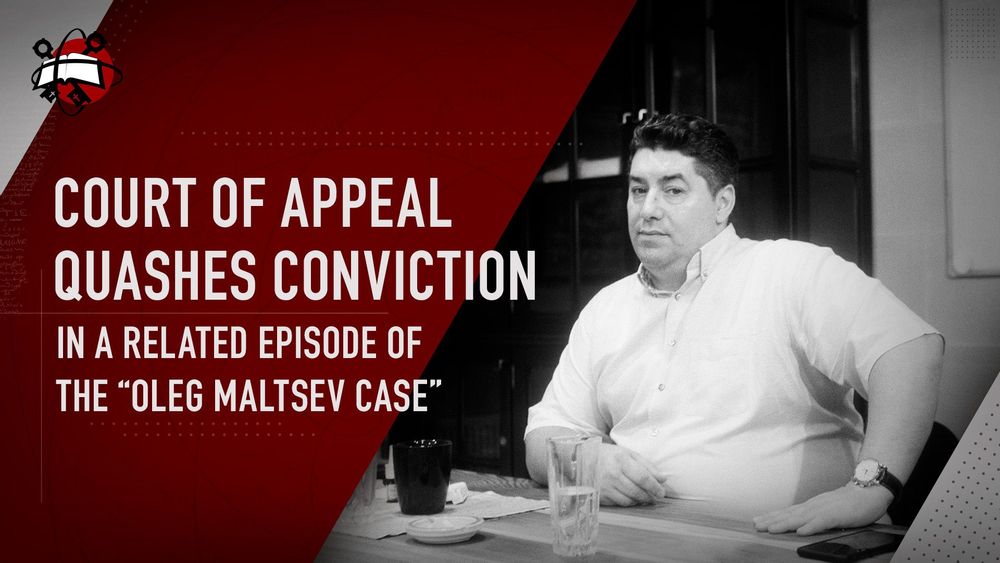Court of Appeal Quashes Conviction in a Related Episode of the “Oleg Maltsev Case”

Mykolaiv, 14 October 2025. The Mykolaiv Court of Appeal has quashed the first-instance conviction of Kyrgyz national Kanykei T. The prosecution had linked the case to the alleged existence of an unlawful paramilitary formation led by Ukrainian scholar Dr Oleg Maltsev.
Case background
In December 2024, the Prymorskyi District Court of Odesa found the Kyrgyz citizen guilty under Article 260(1) of the Criminal Code of Ukraine (participation in an armed formation not provided for by law) and imposed a criminal fine of just under UAH 60,000. According to the prosecution, the defendant belonged to an unlawful paramilitary formation under the direction of Dr Maltsev.
She admitted guilt, agreed to cooperate with the investigation, gave testimony and transferred funds to the needs of the Armed Forces of Ukraine. No preventive measure was applied to her, although – on similar charges – five other individuals (four of them women) have, at the prosecutor’s request, spent a year in custody without the possibility of bail.
On 14 October 2025, the appellate instance quashed this judgment as unlawful.
Defence position
Dr Maltsev’s defence underscores that the appeal ruling once again exposes numerous serious procedural violations.
“The quashing of the verdict confirms our position on the fabricated nature of the accusations and the procedural breaches committed. It is an important step towards restoring justice for Dr Oleg Maltsev and his colleagues, who have been held for over a year in Odesa Pre-Trial Detention Centre (SIZO). And since the Maltsev case has gained international visibility at UN platforms and the OSCE’s Warsaw conference, it is now especially important for Ukraine’s judiciary to acknowledge its mistakes,” the defence states.
What was raised at the OSCE Warsaw Human Dimension Conference
The theme of Ukraine’s “ailing” judiciary and specific actions by judges in episodes related to the Maltsev case were publicly discussed at the annual OSCE Warsaw Human Dimension Conference. Human Rights Without Frontiers (HRWF) presented a written statement, “Ukraine’s Ailing Judiciary: Dr Oleg Maltsev Over a Year in Odesa Pre-Trial Detention,” drawing the attention of delegations from 57 participating States to certain decisions by Odesa judges and to appeal delays which, in their view, are inconsistent with European standards (Article 5 ECHR: necessity, proportionality, and a growing presumption in favour of release over time).
The HRWF material cited by participants highlighted, in particular:
- the imposition of custody without bail despite medical contraindications;
- reliance on questionable expert documents when assessing “fitness for custody in SIZO (pre-trial detention center)";
- the postponement of appeal hearings on technical and procedural grounds;
— all of which, taken together, are “hard to reconcile with the requirements of Article 5 ECHR” and with the principles of judicial independence.
Deficiencies at first instance
When delivering the verdict against the Kyrgyz citizen on 20 December 2024, the court of first instance – acting within the procedural framework – confined itself to her questioning without examining any evidence. Even then, the defence pointed to significant procedural violations and voiced doubts regarding the witness’s psychiatric state.
Notably, in the interview record of 16 July 2024, when asked by the case officer why she had ceased cooperation with Dr Maltsev, the Kyrgyz citizen stated verbatim:
“I stopped cooperating with Oleg Maltsev because I had a life-dream in which my father from the planet Tiniya, Mount Tin, made of pure crystal and gold, told me to find him urgently and to realise myself as a person and accept the true truth.”
Implications of the appeal ruling
The quashing of the verdict creates substantial legal and reputational risks for the prosecution, once again signalling to Ukrainian judges that following the prosecutor’s lead in the Maltsev case may endanger their positions and future judicial careers.
In the defence’s view, this decision further demonstrates that any covert cooperation between judges and law-enforcement bodies ultimately leaves responsibility solely with the judge. In the broader context, this aligns with what partner human-rights organisations have already identified on the OSCE platform as systemic problems in Ukrainian judicial practice in matters connected to Dr Maltsev.
Reputational effect for the media
As the defence emphasises, the quashing of the verdict will have consequences for outlets that celebrated a “victory for the prosecution” after the first instance and circulated sensational interpretations of the case. Editorial teams will now have to either correct earlier materials or assume reputational risks for breaching standards of accuracy and balance.

